|
Enter content here U.S. Secretary of State Colin Powell meets with Macedonian President Boris Trajkovski (L) at the State Department in Washington, February 4, 2002. Trajkovski attended the World Economic Forum in New York City before arriving in Washington today for a three-day visit. REUTERS/Hyungwon Kang Thousands of ethnic Albanian protesters hold portrait pictures of the people they demand to be released during a demonstration in Pristina Monday Feb. 4, 2002. The protesters were demanding the immediate release of three former ethnic Albanian rebels arrested under suspicion of war crimes. (AP Photo/Visar Kryeziu) Some 5,000 ethnic Albanians holding Albanian flags and banners saying "Freedom for Liberators of Kosovo" protest in the streets of Kosovo's capital Pristina on Monday, Feb. 4, 2002, demanding the release of three former ethnic Albanian rebels arrested on war crimes allegations. (AP Photo/Visar Kryeziu) The Shootings Go On And On In Kumanovo and Tetovo Regions. MIA 175 Shootouts In Tetovo, Gostivar And Kumanovo Region Sunday Night Skopje, February 4 (MIA) - Centre for Media Activity informs 175 shootouts have been registered in Tetovo, Gostivar and Kumanovo region during Sunday night.
Around of 91 sporadic and 12 rifle shootouts have been registered from the villages of Odri, Gajre and Prsovce, Tetovo region. Two detonations have been heard from direction of Recica around 04:00 hours.
In Kumanovo region, 43 sporadic shootouts have been registered from the villages of Vaksince, Matejce and Cerkezi and 16 sporadic and 11 rifle shootouts from the village of Toplica, Gostivar region.
Ethnically mixed police teams Monday are to start the patrolling in the villages of Ciflik and Larce, Tetovo region.
-------------
Situation In Kumanovo Region Until 10:00 Hours Skopje, February 4 (MIA) - Armed terrorist groups have not violated the public order and peace Sunday night and Monday morning in Kumanovo - Lipkovo region.
Last 25 sporadic and 11 rifle shootouts have been registered Sunday afternoon from the villages of Vaksince, Slupcane, Lojane, Nikustak, Otlja and Orizare.
Mixed police teams are patrolling 6 hours a day in the villages of Matejce, Otlja, Lipkovo and Orizare as planned.
-------------
Situation In Tetovo Region Tetovo, February 3 (MIA) - Sporadic shootings, coming from various directions were heard frequently in Tetovo late Sunday, MIA's correspondent reported.
According to Tetovo police department, shootings were coming from the villages of Odri, Gajre, Neraste, Prsovce, Dolno Orasje, Zelino anf the localities of Tuneli, Tetovo Teke, the Juvenile Correction Institution, Rasadiste and the SEE University.
The Macedonian security forces did not respond to the armed provocations. Petranka Kostadinova Killed In Traffic Accident. A1 TV 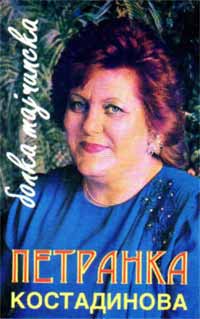
Petranka Kostadinova By Irina Gelevska, A1 TV
Skopje - Last evening at about 7 p.m. Petranka Kostadinova, the legendary diva of Macedonian folk music, lost her life in a tragic traffic accident.
A car passing on a red light hit the singer while she was crossing the road at the crossroad near the Court House in Skopje. The hit was so severe that Kostadinova died instantly. The driver Goran T. from Skopje, born 1973, tried to help the victim and turned himself to the police after the accident.
Petranka Kostadinova begun her career in the 1970s in the Folk Assembly "Kocho Racin" in Skopje. She has published more than 10 LPs and lately dozen of CDs. Her songs mostly with patriotic topics were performed at almost every wedding or at other celebrations in Macedonia. Petranka Kostadinova often visited the Macedonian immigrants in Australia, Europe, Canada and USA. She left a husband and two children. A MEETING OF CEI NATIONAL CO-ORDINATORS. MIA 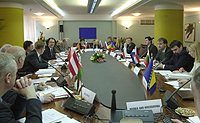
National Co-ordinators of the Central European Initiative (CEI) member countries meet in Skopje on February 4-5 at the Ministry of Foreign Affairs. The Republic of Macedonia is this year's holder of the CEI Presidency.
The meeting gathers representatives of all 17 CEI member countries, including the CEI Executive Secretariat Director General, Austrian Ambassador Harald Kraid.
According to an announcement of the Macedonian Ministry of Foreign Affairs, the meeting will be focused on setting of time table of the future CEI activities, including overview of projects, financed by the CEI co-operation fund, preparations for ministerial meetings, analysing of an idea for foundation of the CEI university, adopted at last year Summit in Trieste.
CEI is the oldest and largest regional organization in Europe. Members of CEI are: Macedonia, Albania, Austria, Belarus, Bulgaria, Bosnia, the Czech Republic, Hungary, Italy, Poland, Romania, FR Yugoslavia, Ukraine, Slovenia, Slovakia, Moldova and Bosnia and Herzegovina.
According to the plan, Macedonia - as holder of the CEI Presidency in 2002, is to organize Meeting of the Heads of Government in Skopje, and Meeting of the Ministers of Foreign Affairs, in Ohrid on July. 130-ANNIVERSARY SINCE BIRTH OF MACEDONAIN REVOLUTIONARY GOCE DELCEV MARKED. MIA 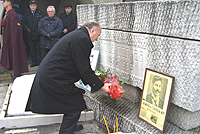
The international manifestation "Goce's Days," which is held for the 36th time this year, marks the 130-anniversary since the birth of revolutionary Goce Delcev.
Church service was held in front of his tomb in "St. Spas" Church in Skopje held by Metropolitan of Polog and Kumanovo Kiril, accompanied by numerous priests.
"A nation that cannot respect its heroes does not deserve to have them," Metropolitan Kiril said, adding that by respecting the work of the Macedonian heroes "we will make testimony that we love Macedonia and we will be respected by the civilized nations in the world."
In his speech focused on Goce, PhD Dimitar Dameski emphasized that the jubilee 130-anniversary "is dedicated to his visionary message for cultural competition among the nations."
Calling him "authentic fighter for autonomous struggle for freedom," Dameski pointed out that "the short but impressive biography of Delcev is dedicated to Macedonia and its freedom."
"A nation with children like this have certain future," Dameski concluded.
The members of the City Choir "Vardar" with conductor Ilija Atanasov performed at the church ceremony, and also lyrics were read by actor Slavko Ninov. 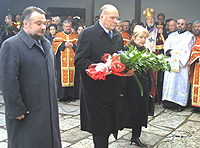
Fresh flowers were laid at the tomb of the Macedonian ideologist and visionary by the state delegation led by Parliament's speaker Stojan Andov, who is patron of the manifestation. Delegation from the Assembly, from "Goce's Days" manifestation, from the Macedonian Army, from City of Skopje, from the Fighters' Association, delegations from Delcevo, Struga, Tetovo, Bitola, Debar and Podgorci village, from the Macedonian Academy of Sciences and Arts, the Macedonian Writers' Association, the Institute on national history and the Institute of history within the Faculty of Philosophy, delegation from the Macedonian Red Cross, from the Jewish Community, the Association of the Children-refugees from the Aegean part of Macedonia as well as the representatives from the political parties, the enterprises, the local communities, schools, associations bearing his name as well as many citizens from the country and abroad visited his tomb.
Fresh flowers were also laid in front of Goce Delcev's monument in the City Park in Skopje, and the celebration of his birth would continue on Monday night with Formal Academy in the Macedonian National Theater, where the Choir of the Faculty of music arts will perform.
The anniversary since the birth of Goce Delcev was also celebrated in Strumica, where flowers were laid in front of the grand monument on the square bearing his name.
In the presence of several citizens, cultural, educational and public employees from Strumica region, the students from the school in Veljusa village, which bears the name of the patron, performed musical recital.
Similar cultural and artistic manifestations were organized in the Elementary Schools "Goce Delcev" in the municipality's centers in Bosilevo and Vasilevo. In "Vlado Smilevski - Bato" elementary school from Strumica the new central heating will become operational. The Macedonian Government i.e. the Ministry of Education and Science invested Denar 6,7 million, from the Telecom's sale.
The anniversary was also marked in the elementary schools "Goce Delcev" from Tetovo and Stence village. POLICE PATROLS ENTER VILLAGES OF CIFLIK AND LARCE NEAR TETOVO. MIA Ethnically mixed police teams entered Monday in the villages of Ciflik and Larce near Tetovo for the first time. In this region, regular police patrols were also carried out in the villages of Rogle, Novo Selo, Kopacin Dol, Lukavica, Sedlarevo and Dobarce.
Regular patrolling aslo took place in the villages of Matejce, Otlja, Lipkovo and Orizare near Kumanovo; Mojance and Orlance near Skopje, and Srbinov Beloviste, Lakavica, trnovo, Padaliste and Strajane near Gostivar.
The police team, which was to carry out an investigation on damaged houses in the village of Setole, would postpone its task for tomorrow due to impassable roads, The Media Activity Center said. All The Commodities That One Can Have... Reality Macedonia Human Rights Fighters, were fighting for what they did not have, or something else?
Types of complaints: "Oh! We are suppressed by the officials, we cannot speak our own language, we cannot write and read our own language, etc, etc"...
Two official daily newspapers Fakti and Flatka, couple of magazines, time on the National TV broadcasted in Albanian, radio broadcasting, are just some of the things that the Albanians have been complaining that they do not have.
I wonder, maybe we should invent a telepathic communication device that works in Albanian; maybe the Macedonian people in Macedonia should start learning Albanian since they are born to make Albanian population in Macedonia and elsewhere happy so they stop shooting?
By Irina Gelevska
Skopje-For some time back, the US Embassy in Skopje has been using the Albanian language in communications as frequently as the Macedonian language. The same goes for the German and British Embassy in Skopje. In these embassies about half of the staff are ethnic Albanians, all the necessary information for visa etc, are written not just in the official Macedonian language, but also in Albanian. If you dial the following telephone numbers of the embassies you will hear the answering machine in three languages: the official language of the foreign country, Macedonian and Albanian.
Diplomats in the US Embassy don't want to give any official answer on why the embassy is using the Albanian language. A representative of the German Embassy said that they have Ethnic Albanian employees and they use the Albanian language as a working language because they have a lot of applications for visas from ethnic Albanians from Macedonia and Kosovo. But this employer of the German Embassy, by the way, ethnic Albanian, has no answer why they don't have any employees in the embassy that speak Roma language because there are also many Romas who want to get a visa for Germany or are already working temporarily there. "Sometimes we are impolite to Romas because sometimes that is out of our control. You know that Romas are with very low level of education and they don't speak Macedonian very well." said the Albanian employer in the German Embassy.
The Ambassador of the British Embassy was the only diplomat who had an official answer. According to this embassy they are using the Albanian language as a working language because they were hoping for some great financial effect from it. There are a lot of Kosovo Albanians coming to the Embassy in Skopje to ask for a visa for the United Kingdom.
These embassies in Skopje are simply following the modern trends in the policy of Macedonia, where almost every document is printed in Albanian as well as in Macedonian. Even the Press Releases of international organizations such as NATO, OSCE, EU, ICRC, UNCHR, are also translated into Albanian as well in Macedonian. "Professional courtesy"-they say for the Albanian journalist, who by the way speak Macedonian. Or as the Albanian employer in the German Embassy said that though the Albanian language is not an official language in Macedonia, it is a recognized language.
USA Embassy +3892116180
German Embassy +3892110507
British Embassy +3892109941 Local Albanians Vow That They Wont Make Problems As Police Enter Lipkovo, Otlja and Orizare. Dnevnik 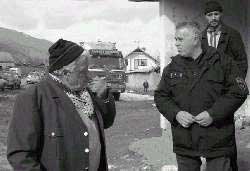
Police enters Lipkovo after long months of absence. "I feel sorry for all Macedonians who died in the fights and I express my condolences to their mothers," said the president of Otlja community.
By Dejan Nikolovski
Translated by Natenane
Six police officers of ethnically mixed police patrols entered Otlja, Lipkovo and Orizare villages in Kumanovo area and made a tour in those three villages. Police officers first entered Otlja village, where they were greeted by president of that community, Fejzula Ljatifi.
- We take Albanian oath (besa) that local people wont make any troubles in the achievement of the plan for return of the police. I feel sorry for all young Macedonians who died in the fights and I express my condolences to their mothers. Many houses in Otlja have been destroyed, but we will rebuild them - said Ljatifi.
During the arrival of the police in Lipkovo village, the mayor of that municipality, Husamedin Halimi, said that he was pleased of how the plan for patrolling of mixed police teams was functioning.
- The patrolling of the police is achieved as it was arranged with international community as well as with Macedonian Government. Two thirds of Lipkovo municipality have been included in this plan that will develop without problems. The signs which have come from Macedonian Government these last days have positive effect. After the situation becomes normal, meaning and necessity of Macedonian army and police check points will be lost and they will withdraw. Couple of days ago we didnt allow the police to enter Otlja, Lipkovo and Orizare villages since the Court in Kumanovo didnt respect Amnesty Declaration for NLA members. However, we dont intend to protect those neighbors of ours who committed crimes that havent been anticipated in amnesty. They should answer for their crimes in the court of law - said Halimi.
Ethnically mixed police teams were accompanied yesterday by OSCE observers, EU observation mission and soldiers from Amber Fox mission, during the fulfillment of their assignments.
There are several smaller villages which are in the mountain area so it is impossible to reach them for now. The main problem are Slupchane, Vaksince and Lojane, where people still work on the efforts for building trust in the police - said Tanevski. All-Action Former Bodyguard Is Bulgaria's Favorite. Reuters 
By Anatoly Verbin
SOFIA, Bulgaria (Reuters) - A straight-talking action man with cropped hair, designer stubble and a karate black belt has become the most popular man in Bulgaria. General Boiko Borissov used to act as bodyguard to the country's leading politicians -- now he himself is riding high at the top of the opinion polls. After years of post-Soviet stagnation and corruption, Bulgaria's weary voters have seized upon the burly 42-year-old as a man who might finally start getting things done.
But despite his unconventional approach, Borissov himself says he learned everything from the two leaders he used to protect: the late Communist dictator Todor Zhivkov and former King Simeon II. ``I have had two universities, one with Zhivkov and one with the king,'' he told Reuters in an interview. ``For years, in an informal atmosphere, I heard and watched those two great men in the history of modern Bulgaria. ``In their own way, each loved the state and the people -- each was an exceptional individual.''
Last month Borissov was given the rank of an Interior Ministry general to match his title of the ministry's chief secretary, or number two. Ordinary people say they like him because ``he is the only one at the top who does something, explains what he does and is not afraid to confront anyone.'' One newspaper called him the ``Sheriff of the Nation.''
THE DOING OF THE KING.
Borissov, sitting at a table on which a general's epaulettes, still not fixed to his uniform, lie alongside a pistol, has a more modest explanation, saying it is all the doing of the king, now prime minister Simeon Saxe-Coburg. ``He appointed me, so if my rating is high, that means that his should be even higher. It is like a soccer coach -- the better the players perform, the better the coach.'' His work and high public profile have won him something approaching the status of an idol in a country where 12 years of shaky democratic reforms for many mean chaos, rising crime and higher prices.
Borissov shot to fame within months of starting his job by personally heading raids against drug traffickers and gangs of criminals who were holding up cars on Bulgaria's roads, robbing the occupants and stealing their vehicles. He speaks publicly on issues that concern him such as corruption in soccer and football hooliganism, a weak legal system and the need to change the constitution to enforce law and order. He hit headlines recently with objections to traffic privileges for cars carrying members of parliament.
``I am uncompromising toward everyone ... We should have rules, otherwise we will be a third-rate state. Democracy is order ... it is elementary,'' said Borissov. Zhivkov and Simeon taught him how to deal with the political elite.
``I learned a lot from those two men and that is why I have no problems arguing with politicians. I do not see them as members of a class that has an advantage over me,'' he said. ``While 90 percent of politicians are in it for the glory, I have the weight of my background behind me.''
COLORFUL BACKGROUND.
Under Zhivkov's rule, Borissov, who had an excellent academic school record, was permitted only to join a fire-fighting college because his grandfather had been purged by the communists. Borissov went on to become a teacher. Zhivkov was ousted in a party coup in 1989. Two years later, Borissov, by then a karate expert, founded a private security firm, Ippon, which guarded many dignitaries. In 1992, Borissov offered his services to Zhivkov, then under house arrest.
``In 1992, when everyone turned Zhivkov down, when it became not only non-prestigious but also harmful to deal with him, I came to him and stayed until he was buried (in 1998),'' he said. Borissov said the man who had ruled Bulgaria with an iron hand for 35 years became ``much more human'' after his overthrow. ``By the end of his life, Todor Zhivkov saw me as member of his family,'' he said.
In 1996, Simeon II who had been living in exile in Spain, chose Ippon to guard him during his first visit to Bulgaria since 1946. Borissov remained his bodyguard until after the parliamentary election in June 2001, which the king's movement won. Just one glance at the heavily built Borissov, wearing a black leather jacket, short haircut and the stubble, was enough to keep crowds at bay.
Borissov said his experience at Ippon, which employed 2,000 people, helped him in his current job. ``I was used to managing many people and to being in charge. I am doing the same here. In private firms, if you do not support things, they break down. When they break down, you have to pay. Here, it is taxpayers' money.'' A resident in his native town of Bankya, having failed to get the local authorities to fix a water pipe, said: ``I need to get to Borissov. He can fix everything in this state.'' BSP Decides about the Vote after a Meeting with Simeon. Standartnews Bogdana Lazarova
Stela Kovacheva
The leadership of BSP and the BSP parliamentary group want a meeting with the PM after which they will decide whether to support the non-confidence vote to the government, Yanaki Stoilov said. At this meeting by 10% higher aids for electricity and central heating will be demanded, as well as rescheduling of the bills, increase of the social aids in the winter months at the expense of the summer months, lower litter and patent taxes. No political conditions will be discussed. If the governors refuse to hear our demands, the BSP will change its stand and will increase the pressure on the cabinet, BSP MP Tatyana Doncheva warned in Razgrad. Diplomat Recalled from Skopje To Take Over US Mission in Sofia. Standartnews The new ambassador will be granted an agrement in 10 days, Foreign Minister Passy maintains.
Bogdana Lazarova
Diliana Dimitrova
US special envoy of President George W. Bush to Macedonia James Pardew will be the new USA ambassador in Sofia, a diplomatic source said for "Standart". He is to replace Richard Miles who was granted an agrement to head the US mission in Georgia. Pardew was preferred before now Mile's deputy Roderick Moor, well-informed sources say. Last fall, Pardew was recalled from Skopje at the urgent request of Macedonian authorities, after the scandal that flared in line with his numerous statements for more rights to be given to the Albanians and about amendments to the Constitution. "Within 10 days Bulgaria is to grant an agrement to a new US ambassador in Sofia," said Foreign Minister Solomon Passy for the Bulgarian National Radio. He, however, declined to name the precise person. "It is a name well-known in the Balkans," Bulgaria's Diplomat No 1 hinted. Part Of The Russian Debt To Bulgaria Might Be Paid With Subway Carriages. SEEurope The proposal part of the Russian debt to Bulgaria to be paid with subway carriages is going to be discussed at the session of the Joint Bulgarian - Russian Committee, which is to be held in Bulgaria on 21 and 22 February, the Foreign Minister Solomon Passy announced. He commented his visit in Moscow as follows:
"I think it was really useful visit in political respect, which also has very distinct economic dimensions."
The Minister added that both the Mayors of Sofia and Bourgas and the businessmen, who accompanied him in Russia achieved arrangements for a few thousands USD. BG Will Lag Behind Even As EU Member. Standartnews Vladislava Peeva
Bulgaria's sources of finances are drying up. Once again the European Commission dampened our hopes for membership introducing new regulations for the allocation of its budget. According to them, the countries that join the EU last will be getting only 25 % of funds at the starting point. Then it will grow by 5 % yearly until they reach the level of the current EU members. This means that even as an EU member Bulgaria again will be lagging behind. The limited financing of our projects will impede the development of the economy, which fully relies on loans. As for the World Bank, it has declared that it is going to re-channel its credits from the Balkans to Central Asia. On the background of the deficit of soft credits for big infrastructure projects in construction, energy or agriculture, only international banking institutions will be able to give a helping hand. However, they dictate murderous terms. Another option are sales and concessions. But EU is also against the golden shares when it comes to big companies. In a nutshell, the signals Europe sends to Bulgaria are more and more telltale. And the attitude to the country is far from that to a desired partner. Pupils To Boycott Experimental School-Leaving Exams. Standartnews Teenagers are to submit blank sheets in spring.
Venelina Yanakieva The pupils all over the country should boycott the experimental school-leaving examinations by handing in blank sheets, the Plovdiv Pupil's Council appealed yesterday. Representatives from all schools in the city are taking part in this council. The boycott is a stage in the organized nationwide protest against the three obligatory school-leaving exams, the Ministry of Education intends to introduce from next year on. More than 12 thousand pupils have already signed the written pledges against the obligatory exams, that are being collected in all big towns in Bulgaria. To pupils, the school-leaving exams are pointless if they are not valid as matriculation examinations. Bulgarian Mayor to Attend a Party with Queen of Britain. Standartnews Roumen Dimitrov invited at the anniversary of Elizabeth the Second.
Vulcho Milchev
Mayor of Kardzhaly Roumen Dimitrov and his wife will travel to England, where they will attend the party in honour of the Queen, in which she herself will take part. The invitation is for the celebration of the 50-th anniversary from the ascension on the throne of Elizabeth the Second and comes from the leadership of the English municipality East Staffordshire, the mayor himself said. According to the program, the mayor of Kardzhaly will be present at the welcoming of Queen Elizabeth and Prince Charles in East Staffordshire. Kardzhaly and Staffordshire are on friendly terms since the beginning of the 90-ies. From the Bulgarian mayors only Stephen Sofiansky and his wife have been so close to the Britain's Royal Family. Two years ago they attended the traditional garden party the Buckingham throws every year. We didn't avail ourselves of the 'bounties of socialism' Standartnews 
Controllable authorities, backward economy. We put up with anarchy and absence of control for 12 years, we didn't learn to forgive.
'STANDART': Bulgaria will further go through major tensions for one reason: it still hasn't experienced something, it has failed to explain everything in its history. For this reason we decided to invite people capable of talking before society from different angles on what this country failed to go through in recent years. On what the BSP, the UDF and our state as an economic and moral system failed to experience. If we speak out these things and help society surmount them maybe we'll be useful.
Vassil Garnizov: Educated people in Bulgaria are concerned with the question of what happened in recent years. The answers are extremely diverse. And extremely mythological - the Great Powers or part of them which don't like us, launched a plot and ousted the ruling elite and now we wonder what to do with the new ruling authorities.
'STANDART': The myth of the alien forces is reproduced every two years - nothing depends on us in Bulgaria.
Assoc. Prof. Bozhidar Dimitrov: Actually, none of the great powers is concerned with what's taking place in Bulgaria, in who and how he's ruling. As a historian I should be the first to speak. But it's difficult to me. Because I need documents. From abroad - to get to know what happened in Malta in 1989. And a little earlier, when Gorbachev signed some agreements. What commitments were undertaken, whether there were any secret clauses under the publicly declared agreement. How by that agreement the two blocs decided on how the world would live from that moment on.
As for the missed opportunities, one of them was that no political elite was being shaped up. The second missed opportunity is directly connected with the first one. A low quality elite engenders lots of other problems. Not only that they aren't aware of what they should do to become rulers. But maybe it doesn't want to. While in power, similar persons wish to get rich, to turn into Bulgarian bourgeois, to deal out the cards to themselves.
V. Garnizov: Failing to create a qualitative elite, we failed to create a functioning elite.
Assoc. Prof. B. Dimitrov: Yes, and this explains all missed opportunities to use everything that has been created. I coined a term for it - "the lard of socialism". Now we don't have 6,000 industrial enterprises, the irrigation systems are ruined. Our elite farms are history. So, the question suggests itself, are there any clauses in the Treaty of Malta saying that Bulgaria should pay reparations in the form of her destroyed industry and agriculture.
Emel Etem: In the last 12 years we all lived through the transition and took part in it. I agree that not everything that happened was due to the desire of the Bulgarian people to get liberated from the totalitarian regime. However, I think we had the possibility to table our terms. I've been keeping an eye on every statesman who took up a high post in the last 12 years. Why at a certain moment this man, who was one of us, defended the same ideas, all of a sudden changes so drastically?
Assoc. Prof. B. Dourankev: Thirteen years ago, together with Ivan Kostov, Ventsislav Antonov, Ljubomir Kostov and other economists we prepared a thorough research based on real data. It showed that Bulgaria was one of the poorest countries in the world before the World War II managed to move up into the group of the medium developed countries till 1990. This is an unprecedented leap. And it happened due to the system which in Bulgaria we call "totalitarian rule" and in France they call Gaullism...
Assoc. Prof. B. Dimitrov: State-controlled capitalism of a sort.
Assoc. Prof. B. Dourankev: There was a dream that within a short time we shall enter the pan-European home where we all will be welcome. In spite of the fact that in Bulgaria the economic growth was more rapid than in Japan, in the 50's we ranked 37th in terms of economic development, nowadays the distance between us and the developed countries is enormous.
Emel Etem: Why do we always blame others? Why didn't each of us do his best to prevent the country from reaching this point? I agree that we cannot draw up our plans ourselves, we do depend on the foreign influences. But why can't we be more persistent, impose our interests and make them clear to all, as dignified people would do? We all know what are the advantages of Bulgaria. The country has the key geostrategic position. Where are the Bulgarian statesmen who are prepared to make this move. The blame is definitely ours.
V. Garnizov: Two radical theses were formed. Bulgaria's history is written elsewhere, the Bulgarians were deprived of choice. For certain circles, however, the views defined by Mrs Etem, are valid: We ourselves are writing our history.
Prof. Peter-Emil Mitev: Talking about the lessons of the Bulgarian transition, there are some lessons learnt. We learnt that the right road is towards Europe and NATO. There are lessons half-learnt. Among them is the one that we have to close down the factory producing illusions (quoting ex-president Peter Stoyanov). There are also lessons not learnt at all. And the most important is that in our drama, we are the actors and playwrights, we are the protagonists.
The hypothesis of some mysterious scripts does not sound convincingly. These two versions are quite different but they have one thing in common: in either of them the point is that there is something predetermined, something beyond us, something static.
Dr Nikolai Mihailov: One of the major issues is when are the Bulgarians to lose their patience? We are speculating upon it. Some of the failures of the Bulgarians and the Bulgarian people are due to a thing which I'd call culture of the egocentric rhetoric. Do you believe, that it does not reflect upon the contemporary spirit of the Bulgarians?
We had no resistance against that offence against human nature, called communism. Those, who survived as "clappers" of that regime, can't forgive the others. They themselves are living in a regimen of dramatic guiltiness, they are working on the guilt but in a pathologic way. Actually they would and could not ever forgive their sense of guiltiness to anyone and wittingly or unwittingly sabotaged the consensus of the Bulgarians in a period of crisis. The Bulgarians have not the habits of a civilized way of life and are not stabilized in a memory that would propose to them some modes of historical courage, so indispensable in this transition. This courage should have be assisted by an element of consent concerning the priorities and refusal to take part in these irreconcilable antagonisms of the struggle for property and for erasing sectors of one's biography.
"Standart": It means that each one of us hates oneself and therefore the others for the fact that under communism, one was not free to resist. And now we are taking revenge for the fact that we did not chose to resist.
(Abr) UDF Uses Non-Confidence Vote for Its Own Purposes. INTERVIEW Standartnews: Sergey Stanishev The problem of the government is lack of coordination, says BSP leader Sergey Stanishev.
Nadelina Aneva 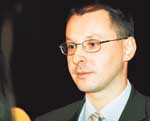
- Mr. Stanishev, in the last six month the ruling majority has made a lot of mistakes. Even they admit it. In your opinion, what mistakes has the BSP made, don't you think that your consultations about taxes or energy policy have come too late? - Let's talk about the ruling majority first. The main reason for their mistakes is that the NMS has not been prepared to run the country. It is common knowledge that the Movement for Simeon II was set up ad hoc to a great extent, they didn't have a political program or a team that would have a clear idea about its goals. The present government was formed in the same way. These flaws explain why it took them so much time to form their teams and set their priorities. And this may prove fatal for a government. As for the Coalition "For Bulgaria", I do not think that we made any fatal mistakes. From the very start of this parliament's mandate we have declared that we shall be a constructive opposition and clearly defined what we are intended to do, as well as what we expect from the government. - Nadezhda Mihailova said that many people were forced to sell their property to pay taxes and presently we witness a process of proletarianization in Bulgaria. Would you agree? - Regrettably, this process did not start yesterday, it has been running for several years now. I think that in the beginning of the 90's the conditions for the formation of the middle class in Bulgaria were very favorable. Then, however, everything took very distorted form and not without the help of the former regime. Now the picture is very dramatic and the process you mentioned is really underway. I cannot take in how within just half a year the UDF all of a sudden began to display such social awareness and put forward social-democratic slogans. And forgot what they were doing when they were in power. - Will you support the non-confidence vote the UDF demanded? - I cannot give any comments before the issue is concerted with the leadership, including that of the Coalition "For Bulgaria" and our parliamentary group. It seems to me that the conduct of the UDF and their demand for a non-confidence vote are strongly politicized. They sooner want to use the problematic situation to their purpose than resolve the problems with joint efforts. Let's not forget that the national conference of the UDF will be held soon. Probably the right-wing forces need to be consolidated and the best way to do it is to spotlight the enemy. So they say. In any case our policy will not depend on what the UDF is doing. We shall follow our own course. (Abridged) Minister Petrov Betrays Lack of Foresight. INTERVIEW Standartnews: Herbert Kort Our aim is to make the mobile operator Europe's best, says the new member of the company's Board of Directors Herbert Kort.
Slavka Bozoukova 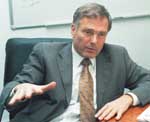
- Mr Kort, what was the state of 'MobilTel' when you inherited the company? - 'MobilTel' is a very interesting company and impresses with its so far remarkable achievements. This holds good particularly of the conditions under which 'MobilTel' had to operate. We have set ourselves new lofty goals. We would like to keep intact the motivation of the people who work marvelously and improve the state of the company which is very good at the moment. 'MobilTel' is a very well run company. However, some changes in the circumstances have already set in and they have to be taken into account. Our aim is clear - to further develop 'MobilTel' and turn it into Europe's best mobile operator. - How do you plan to do it? - It's a very good question. To have this done, objectives and means to achieve them are needed. We are a communications company and what do communications serve for? To ensure interaction. Our aim is to meet to the maximum the requirements of our customers. Not because the services are not good or that we wouldn't like to improve them. The reason is that we haven't achieved any agreement with the government on the new frequencies. The government sells both the frequencies and the right for their use. We approached the minister of transport and communications with a request for new frequencies and we are ready to pay for them. - What's the problem? - The current situation has been aggravated. The former regulatory body - the STC (State Telecommunications Committee) doesn't exist any longer, while the new body will begin functioning from tomorrow. Functioning at the moment is the so-called ad hoc commission including cabinet members who are in charge of the matter. These are vice-premiers Lidia Shouleva and Nikolai Vassilev, ministers Plamen Petrov and Milen Velchev and deputy transport minister Nikolai Nikolov. We met seven times with the ministers. The previous frequency regime was changed. The government declared it planned to cut down the tariff to attract new mobile operators. Not only didn't it do it, but it even doubled the price which is something unprecedented. Such is the law in effect now. From us the government wants 7,3 million levs for 1 megahertz. To get an idea of what this sum is like, let's compare it with the prices in Europe. As an example let's take Austria, my native country which in terms of territory and population resembles Bulgaria. In March last year a tender was held between five companies wishing to buy frequencies from the government. The price ranged between DM 2 and 3 million. It turns out that the Bulgarian government wants a double price. - What other ideas do you have to improve the quality of the services? - The new 'MobilTel' management has decided to lead Bulgaria forward and introduce UMTS - the third generation in telecommunications. The GSMs all of us have now belong to the second generation. The UMTS were devised to meet the needs of our most progressive corporate customers for the speediest possible connections. Their range is much broader, they are cheaper and speedier. For this reason we approached the government and informed them of what we plan to do. However, transport minister Plamen Petrov told us that for the time being the country didn't need any UMTS. Because it seemed to him that if they sold us the UMTS licence, the revenues wouldn't be big enough. And he believes that in a year or two the price of the licence we'll have to pay will be higher. I tried to argue with Mr Petrov, I told him I would have grasped his idea if he hadn't been a government employee. Had I been a member of his government, I'd have tried to attract as many interesting investment initiatives as possible, because this is the way to create new jobs. The first thing the big investors look at when they decide where to invest, are the communication systems. As for Mr Petrov, he said he didn't see the point and that they were to wait to get more money for our licence. This is a manifestation of short-sightedness. A responsible government shouldn't do it. - How do you think your dialogue with the government will continue? - We hope that the minister of transport and communications Plamen Petrov will understand very quickly that what he's doing is not in Bulgaria's interest. (abridged) (SB) |



